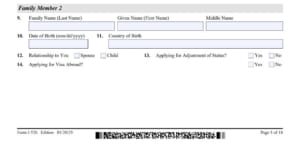 All U.S. visa applicants applying for a non-immigrant visa are required to demonstrate to the consular officer’s individual satisfaction that they are eligible. Since outside documentation such as bank statements, property title deeds, vehicle registration, letters of recommendation, invitation letters, are normally not reviewed by the consular officer unless specifically requested, applicants who are unable to meet the burden that they are eligible for a U.S. visa are issued a Section 214(b) refusal. If an applicant is refused a visa, the only is to re-interview since a refusal for a non-immigrant visa cannot be reviewed or appealed. Thus, the applicant must pay another visa processing fee and submit a new DS-160 Online Application. However, the applicant can use the r the new DS-160 U.S. as a way to establish why they should be issued a visa.
All U.S. visa applicants applying for a non-immigrant visa are required to demonstrate to the consular officer’s individual satisfaction that they are eligible. Since outside documentation such as bank statements, property title deeds, vehicle registration, letters of recommendation, invitation letters, are normally not reviewed by the consular officer unless specifically requested, applicants who are unable to meet the burden that they are eligible for a U.S. visa are issued a Section 214(b) refusal. If an applicant is refused a visa, the only is to re-interview since a refusal for a non-immigrant visa cannot be reviewed or appealed. Thus, the applicant must pay another visa processing fee and submit a new DS-160 Online Application. However, the applicant can use the r the new DS-160 U.S. as a way to establish why they should be issued a visa.
If you have been issued a Section 214(b) refusal for a U.S. visa and would like to consult with a U.S. immigration attorney for expert advice on how the DS- 160 Online Application can be used to support your reapplication, contact us today.




